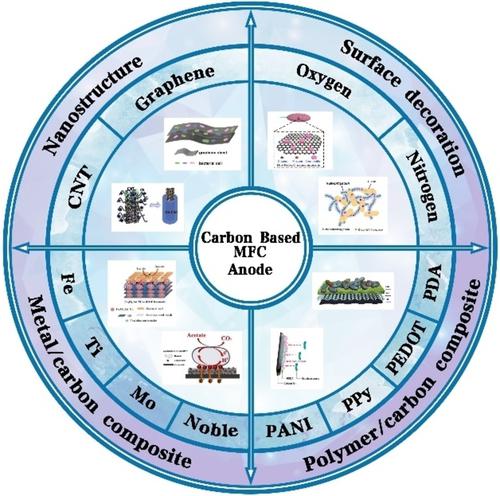当前位置:
X-MOL 学术
›
ChemPlusChem
›
论文详情
Our official English website, www.x-mol.net, welcomes your
feedback! (Note: you will need to create a separate account there.)
Carbon-Based Composites as Anodes for Microbial Fuel Cells: Recent Advances and Challenges
ChemPlusChem ( IF 3.0 ) Pub Date : 2021-07-30 , DOI: 10.1002/cplu.202100292 Xingyuan Gao 1, 2 , Shuxian Qiu 1 , Ziting Lin 1 , Xiangjuan Xie 1 , Wei Yin 1 , Xihong Lu 2
ChemPlusChem ( IF 3.0 ) Pub Date : 2021-07-30 , DOI: 10.1002/cplu.202100292 Xingyuan Gao 1, 2 , Shuxian Qiu 1 , Ziting Lin 1 , Xiangjuan Xie 1 , Wei Yin 1 , Xihong Lu 2
Affiliation

|
Owing to the low price, chemical stability and good conductivity, carbon-based materials have been extensively applied as the anode in microbial fuel cells (MFCs). In this review, apart from the charge storage mechanism and anode requirements, the major work focuses on five categories of carbon-based anode materials (traditional carbon, porous carbon, nano-carbon, metal/carbon composite and polymer/carbon composite). The relationship is demonstrated in depth between the physicochemical properties of the anode surface/interface/bulk (porosity, surface area, hydrophilicity, partical size, charge, roughness, etc.) and the bioelectrochemical performances (electron transfer, electrolyte diffusion, capacitance, toxicity, start-up time, current, power density, voltage, etc.). An outlook for future work is also proposed.
中文翻译:

碳基复合材料作为微生物燃料电池的阳极:最新进展和挑战
由于价格低廉、化学稳定性和良好的导电性,碳基材料已被广泛用作微生物燃料电池(MFC)的阳极。在这篇综述中,除了电荷存储机制和负极要求外,主要工作集中在五类碳基负极材料(传统碳、多孔碳、纳米碳、金属/碳复合材料和聚合物/碳复合材料)。这种关系在阳极表面/界面/体积的物理化学性质(孔隙率、表面积、亲水性、粒径、电荷、粗糙度等)和生物电化学性能(电子转移、电解质扩散、电容、毒性、启动时间、电流、功率密度、电压等)。还提出了对未来工作的展望。
更新日期:2021-08-09
中文翻译:

碳基复合材料作为微生物燃料电池的阳极:最新进展和挑战
由于价格低廉、化学稳定性和良好的导电性,碳基材料已被广泛用作微生物燃料电池(MFC)的阳极。在这篇综述中,除了电荷存储机制和负极要求外,主要工作集中在五类碳基负极材料(传统碳、多孔碳、纳米碳、金属/碳复合材料和聚合物/碳复合材料)。这种关系在阳极表面/界面/体积的物理化学性质(孔隙率、表面积、亲水性、粒径、电荷、粗糙度等)和生物电化学性能(电子转移、电解质扩散、电容、毒性、启动时间、电流、功率密度、电压等)。还提出了对未来工作的展望。











































 京公网安备 11010802027423号
京公网安备 11010802027423号